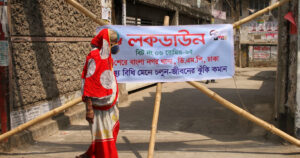Istanbul, Sep 21 (AP/UNB) — Every morning, Meripet wakes up to her nightmare: The Chinese government has turned four of her children into orphans, even though she and their father are alive. Meripet and her husband left the kids with their grandmother at home in China when they went to nurse Meripet’s sick father in Turkey. But after Chinese authorities started locking up thousands of their fellow ethnic Uighurs for alleged subversive crimes such as travel abroad, a visit became an exile.
Then, her mother-in-law was also taken prisoner, and Meripet learned from a friend that her 3- to 8-year-olds had been placed in a de facto orphanage in the Xinjiang region, under the care of the state that broke up her family.
“It’s like my kids are in jail,” Meripet said, her voice cracking. “My four children are separated from me and living like orphans.”
Meripet’s family is among tens of thousands swept up in President Xi Jinping’s campaign to subdue a sometimes restive region, including the internment of more than 1 million Uighurs and other Muslim minorities that has alarmed a United Nations panel and the U.S. government. Now there is evidence that the government is placing the children of detainees and exiles into dozens of orphanages across Xinjiang.
The orphanages are the latest example of how China is systematically distancing young Muslims in Xinjiang from their families and culture, The Associated Press has found through interviews with 15 Muslims and a review of procurement documents. The government has been building thousands of so-called “bilingual” schools, where minority children are taught in Mandarin and penalized for speaking in their native tongues. Some of these are boarding schools, which Uighurs say can be mandatory for children and, in a Kazakh family’s case, start from the age of 5.
China says the orphanages help disadvantaged children, and it denies the existence of internment camps for their parents. It prides itself on investing millions of yuan in education in Xinjiang to steer people out of poverty and away from terrorism. At a regular news briefing Thursday, Chinese foreign ministry spokesman Geng Shuang said the measures taken in Xinjiang were necessary for “stability, development, harmony” and to fight ethnic separatists.
But Uighurs fear that these measures are essentially wiping out their ethnic identity, one child at a time. Experts say what China is doing echoes how white colonialists in the U.S., Canada and Australia treated indigenous children — policies that have left generations traumatized.
“This is an ethnic group whose knowledge base is being erased,” said Darren Byler, a researcher of Uighur culture at the University of Washington. “What we’re looking at is something like a settler colonial situation where an entire generation is lost.”
For Meripet, the loss is agony; it is the absence of her children and the knowledge they are in state custody. A year and a half after leaving home, the 29-year-old mother looked at a photo of a brightly painted building surrounded by barbed wire where her children are believed to be held. She fell silent. And then she wept.
“When I finally see them again, will they even recognize me?” she asked. “Will I recognize them?”
“PROTECTION OF DISADVANTAGED CHILDREN”
When Xi came to power in 2012, an early challenge to his rule was a surge in violent attacks that killed several hundred people and which Beijing pinned on Uighur separatists. Since then, Xi has overseen the most extensive effort in recent years to quell Xinjiang, appointing in 2016 the former Tibet party boss Chen Quanguo to lead the troubled region bordering Afghanistan.
Chen rolled out unprecedented security measures such as the internment camps that hold Muslims without trial and force them to renounce their faith and swear loyalty to the ruling Communist Party. China has described religious extremism as an illness that needs to be cured through what it calls “transformation through education.” Former detainees say one can be thrown into a camp for praying regularly, reading the Quran, going abroad or even speaking to someone overseas.
The camps are among the most troubling aspects of Xi’s campaign to assert the party’s dominance over all aspects of Chinese life, which has drawn comparisons with Mao Zedong. Authorities heeding Xi’s call to “Sinicize” religion across the country have shut underground churches, burned Bibles, replaced pictures of Jesus with ones of Xi, and toppled crescents from mosques. The party also has beefed up its ability to track the movements of its 1.4 billion people, with Xinjiang serving as an important testing ground.
In Xinjiang, detention has left countless children without their parents. Most of these families in China cannot be reached by journalists. However, the AP interviewed 14 Uighur families living in Turkey and one Kazakh man in Almaty with a total of 56 children who remain in China.
The families say that among these children, 14 are known to be in state-run orphanages and boarding schools. The whereabouts of the rest are unknown because most of their adult relatives in Xinjiang have been detained.
Some interviewees, like Meripet, requested that they be identified only by their first names because they feared official retaliation against their relatives. Others insisted their full names be used despite the risks, saying they were desperate for their stories to be heard. They pleaded with reporters to track down their families in Xinjiang, and one interviewee pressed a piece of paper into a reporter’s hand with a Chinese address scribbled on it.
The regional government appears to be moving quickly to build centres to house the children of these exiles and of detainees. An AP review of procurement notices in Xinjiang has found that since the start of last year, the government has budgeted more than $30 million (200 million Chinese yuan) to build or expand at least 45 orphanages, known variously as children’s “welfare centres” and “protection centres,” with enough beds to house about 5,000 children.
In July and August alone, the government invited bids for the construction of at least nine centres for the “protection of disadvantaged children” in the Xinjiang city of Hotan and several counties in Kashgar, Aksu and Kizilsu prefectures, inhabited primarily by ethnic minorities. Most orphanages have a minimum of 100 beds mandated by the government, and some are much larger. One notice called for an orphanage in Moyu county with four four-story dormitories, coming to 22,776 square meters in size — nearly as big as four football fields.
These numbers do not include kindergartens and other schools where some children of Uighur detainees are being housed. It’s impossible to tell how many children of detainees end up at these schools because they also serve other children.
Shi Yuqing, a Kashgar civil affairs official, told the AP over the phone that “authorities provide aid and support to everyone in need, whether they’re the children of convicted criminals or people killed in traffic accidents.” But such services may not be welcome. A government report from Bayingolin Mongol Autonomous Prefecture in June last year acknowledged that relatives were resistant to “handing over” their extended families’ kids to the orphanages because they “lack trust or confidence” in the centres.
A friend told Meripet last November her four children were living in the Hotan City Kindness Kindergarten in southern Xinjiang. The friend said Meripet’s sister-in-law had visited her children and was permitted to take them home for one night only.
The school looks like a house-sized castle, with a bright marigold facade, orange turrets and blue rooftops. Its entrance is blocked by an iron gate and a walled enclosure lined with barbed wire. “We Are Happy and Grateful to the Motherland,” said the red characters emblazoned on one fence.
The principal, who gave only her last name, Ai, told AP reporters that the institution is “just a normal kindergarten.” But the authorities’ anxiety was clear: armed police officers surrounded the reporters’ car minutes after their arrival at the school and ordered them to delete any photos.
Gu Li, a propaganda official for Hotan who also immediately appeared on site, said: “There are really young kids here — some of them may even be orphans whose parents have died.”
A report published this February in the Xinjiang Daily, a party newspaper, called Hotan City Kindness Kindergarten a “free, full-time” kindergarten for children 6 and younger that provides accommodations and clothing to those whose “parents cannot care for them for a variety of reasons.”
“Soon after many of the kids arrived at the school, they grew taller and got fatter, and quickly started using Mandarin to communicate,” the article said. Another state media report in January said $1.24 million (8,482,200 yuan) had been invested in the kindergarten.
Satellite imagery shows that the kindergarten was constructed less than three years ago, just as an initiative was launched to strengthen “bilingual” education in Xinjiang. More than 4,300 bilingual kindergartens were built or renovated last year, according to the government. A report on the project in a state-run regional newspaper said such kindergartens teach children “civilized living habits.”
“The children started educating their parents: your hands are too dirty, your clothes are too dirty, you haven’t brushed your teeth,” the report quoted Achilem Abduwayit, a deputy chief of the Hotan city education bureau, as saying.
Life in an orphanage could have a lasting psychological and cultural impact on children, said James Leibold, an expert on Chinese ethnic policy at La Trobe University in Melbourne, Australia.
“You grow up as a ward of the state,” he said. “They’re told to be patriotic citizens, told that the identity and religion of their parents were abnormal, if not radical, and thus needs to be eradicated.”




